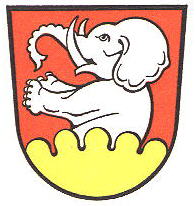Wiesensteig: Difference between revisions
Jump to navigation
Jump to search
Knorrepoes (talk | contribs) No edit summary |
Knorrepoes (talk | contribs) m (Text replace - "[[Literature" to "{{media}} [[Literature") |
||
| Line 17: | Line 17: | ||
====Origin/meaning==== | ====Origin/meaning==== | ||
Wiesensteig was the capital of the Counts of Helfenstein, who also granted the city rights in the middle of the 14<sup>th</sup> century. The oldest seal is known since 1482 and already shows the elephant from the arms of the Helfenstein dynasty, rising from a mountain. All later seals and arms show the same composition. | Wiesensteig was the capital of the Counts of Helfenstein, who also granted the city rights in the middle of the 14<sup>th</sup> century. The oldest seal is known since 1482 and already shows the elephant from the arms of the Helfenstein dynasty, rising from a mountain. All later seals and arms show the same composition. | ||
{{media}} | |||
[[Literature]] : Stadler, K. : Deutsche Wappen - Bundesrepublik Deutschland. Angelsachsen Verlag, 1964-1971, 8 volumes. | [[Literature]] : Stadler, K. : Deutsche Wappen - Bundesrepublik Deutschland. Angelsachsen Verlag, 1964-1971, 8 volumes. | ||
Revision as of 09:02, 9 July 2014
| Heraldry of the World Civic heraldry of Germany - Deutsche Wappen (Gemeindewappen/Kreiswappen) |
WIESENSTEIG
State : Baden-Württemberg
District (Kreis) : Göppingen
Official blazon
In Rot ein aus einem goldenen Fünfberg wachsender silberner Elefant.
Origin/meaning
Wiesensteig was the capital of the Counts of Helfenstein, who also granted the city rights in the middle of the 14th century. The oldest seal is known since 1482 and already shows the elephant from the arms of the Helfenstein dynasty, rising from a mountain. All later seals and arms show the same composition.
Contact and Support
Partners:
Your logo here ?
Contact us
© since 1995, Heraldry of the World, Ralf Hartemink 
Index of the site
Literature : Stadler, K. : Deutsche Wappen - Bundesrepublik Deutschland. Angelsachsen Verlag, 1964-1971, 8 volumes.











